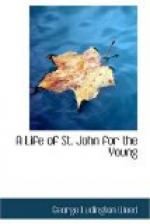In the days of the boyhood of John and Jesus, we thought of their mothers as sisters, and of parents and children as looking for the coming Messiah. None thought of the possibilities of this hour when they would meet in Jerusalem at the cross. By it stands John the only one of the Apostles. Judas has already gone to “his own place.” If Peter is following at all it is afar off. The rest have not rallied from their flight enough to appear after their flight. James the brother of John is not with him. As their mother looks upon Jesus between two robbers, does she recall her ambitious request, “Command that these my two sons may sit, one on Thy right hand, and one on Thy left hand”? She understands now the fitness of the reply she had received,—“Ye know not what ye ask”?
But Salome and John are loyal to the uncrowned King. Though they may not share the glory of His throne, they are yet ready to stand beneath the shameful shadow of His cross.
But another is there,—drawn by a yet stronger cord of affection. She heads John’s list of the women “by the cross of Jesus—His mother,” whose love is so deep that it cannot forego witnessing the sight that fills her soul with agony. Yes, Mary, thou art there.
“Now by that cross thou tak’st
thy final station,
And shar’st the last dark trial of thy
Son;
Not with weak tears or woman’s lamentation,
But with high, silent anguish, like His own.”
—H.B.
Stowe.
As she stands there we seem to read her thoughts: “Can that be He, my babe of Bethlehem, my beautiful boy of Nazareth, in manhood my joy and my hope! Are those hands the same that have been so lovingly held in mine; those arms, outstretched and motionless, the same that have so often been clasped around me! Oh! that I might staunch His wounds, and moisten His parched lips, and gently lift that thorny crown from His bleeding brow.”
But this cannot be. There is being fulfilled Simeon’s prophecy, uttered as he held her infant in his arms,—a foreboding which has cast a mysterious shadow on the joys of her life.
“Beside the cross in
tears
The
woeful mother stood,
Bent ’neath the
weight of years,
And viewed
His flowing blood;
Her mind with grief
was torn,
Her strength
was ebbing fast,
And through her heart
forlorn,
The sword
of Anguish passed.”
She can only draw yet nearer to His cross and give the comfort of a mother’s look, and perhaps receive the comfort of a look from Him, and—oh, if it can be—a word of comfort from His lips for the mother-heart. Perhaps for a moment her thoughts are on the future,—her lonely life, without the sympathy of her other sons who believed not on their brother. Oh! that they were like John, to her already more of a son than they.




